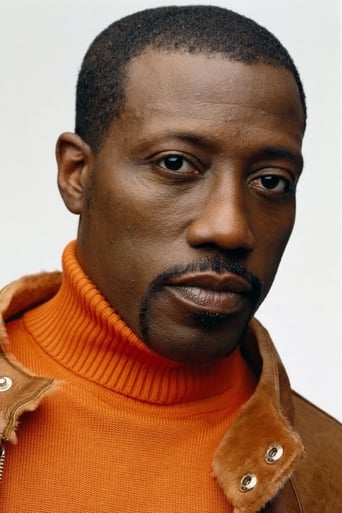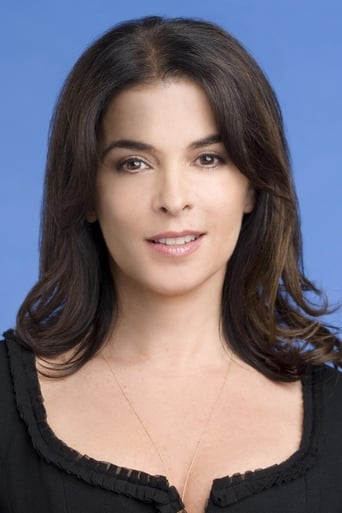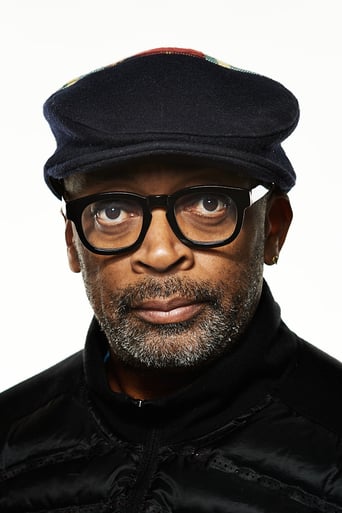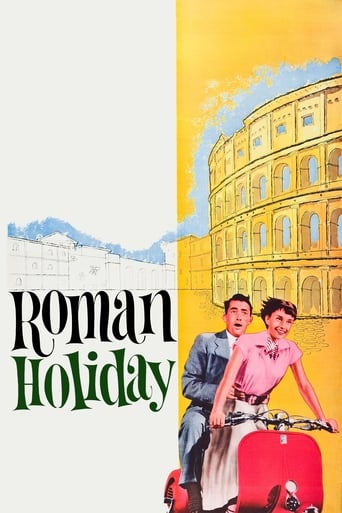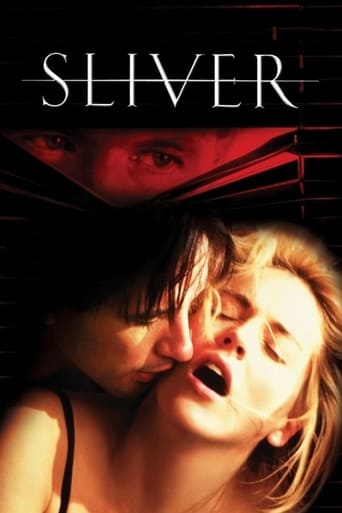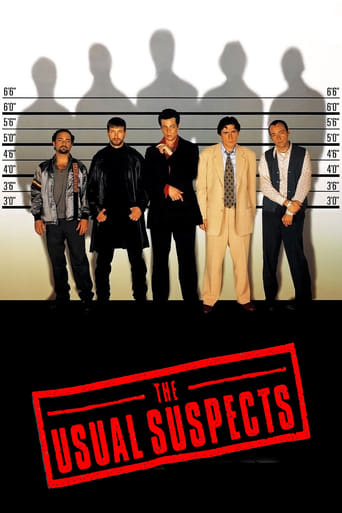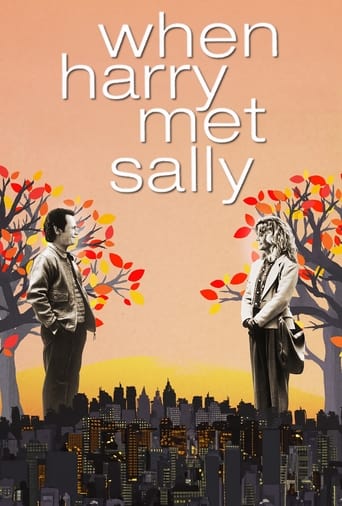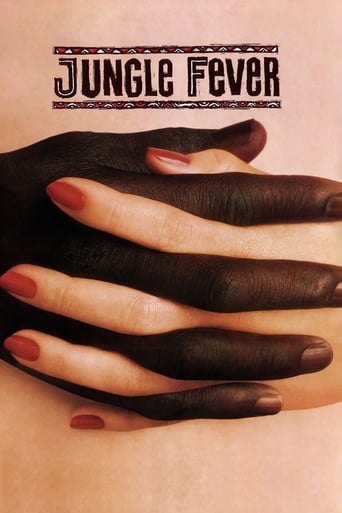
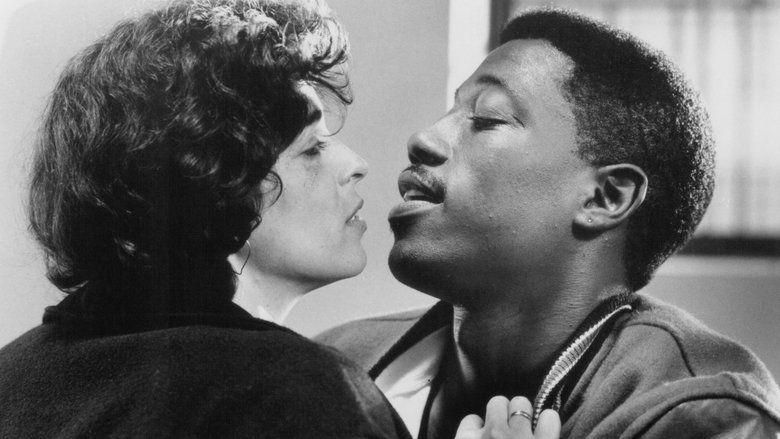
Jungle Fever (1991)
A successful and married black man contemplates having an affair with a white girl from work. He's quite rightly worried that the racial difference would make an already taboo relationship even worse.
Watch Trailer
Cast


Similar titles
Reviews
Sadly Over-hyped
Blistering performances.
It is an exhilarating, distressing, funny and profound film, with one of the more memorable film scores in years,
The film never slows down or bores, plunging from one harrowing sequence to the next.
Flipper Purify (Wesley Snipes) is a black architect with growing recognition, aiming at becoming partner at his current firm. Married with child his wife Drew (Lonette McKee) and daughter Vera (Veronica Webb) are seemingly the apple of his eye. When given an assisrant of Italian roots, Angie Tucci (Annabella Sciorra), Flipper initially objects on racial grounds, opting for a black-skinned subordinate. These reservations soon come to pass, when working nights together they soon uncover a growing fascination with each other, despite their differing skin colours. This soon turns into a romance, which crosses racial boundaries, causing a stir in both neighbourhoods and making them outcasts from their families...American film in general still has racial issues. Seeing a mixed couple on screen is a strangely rare occurrence, despite an increase in Afroamerican actors on the front-line. Even when employed the norm is having non-mixed couples, as if to avoid inciting unpopular furore among both sides of the divide. The exceptions to the norm are few and far between, surprisingly most often introduced by non-American directors. Even less widespread is such mixed couples not being the core of the story told - a notable exception is "Things We Lost In the Fire" by Dane Susanne Bier, where Halle Berry and David Duchovny create a loving couple with race issues never even implied.This speaks volume why "Jungle Fever" and the issues touched remain poignantly important till this day - the concept of mixed race pairs is so innerly counter-cultural to the American society at large, even more so than in Europe or light years behind the formerly racial South Africa. Spike Lee therefore located a subject mine for a classic movie, which would stay in memory for its breakthrough content. However Spike Lee wouldn't be himself, if he hadn't resorted to some tricks of trade, flashing audiences with subplots, which do nothing but distort the core theme (Flipper's flailing career or an absolutely detrimental story about his brother the narcomaniac). Meanwhile the racial issues themselves get dragged down with overly preachy monologues or dialogues, finally delivering little in terms of a satisfying conclusion. Seemingly afraid of going the mile Spike Lee finally pulls up and offers a screeching happy ending, but somewhere within this feverish mixed racial love the context becomes diluted. Already permeating with an unmistakable style, patchy story lines and venturing camera shots, Spike Lee's trademarks came to fruition, but unfortunately with a movie being a far cry from "Do the Right Thing" or "The 25th Hour", proving to be a director renowned for a very uneven film career.
Spike Lee's "Jungle Fever" is an eye-opening introspection into the limits of that so-called melting pot sold by America as the epitome of tolerance and universalism... yet contradicted by the statistics and all the racial tension that prevailed in the early 90's. As a social commentary, the movie raises many important issues about interracial relationships in a less politically lauded tone than the iconic "Do The Right Thing", which is a wise choice for a movie mostly centered on human relationships.Through Stevie Wonder's titular song, "Jungle Fever" refers to the diagnosis of that strange mutual attraction between two persons from different races. The term strongly implies the idea of a relationship against Nature's law, if not a sickness, a deviation. And the central couple to deviate is Flipper, an ambitious architect, and Angie, his new secretary. He's Black, she's Italian. He lives in Harlem, she's from Benston Hurst, he's married with one daughter, she has three men, and two too many: her father (Frank Vincent), and her two brothers. Angie's doom is that she's young and single enough to be the overprotected sister, but mature enough to take care of the house. Angie dates Paulie, a shy and affable storekeeper (John Turturro) in a relationship that doesn't really ring true. Whatever is obviously lacking, Angie would find it in Flipper.Spike Lee's direction patiently depicts the growing attraction between Flipper and Angie. Interestingly, the first door to a growing intimacy is opened when they break the taboo of races and talk about it in the most casual way. And after that, we stop looking at the difference of skins, and pay more attention to the contents of their hearts. So they have sex, and no sex scene is sugarcoated in Spike Lee's film, not overdone either, but what is Spike Lee's point? To insist that it's only sexual like in adultery, or because of the 'Jungle Fever'? Whatever theory we believe in, the relationship would be wrong, but Lee cares less about pleasing us ethically than inviting us to examine the aftermath of that pivotal night where a Black man and a Italian (Caucasian) woman did it. And the way the relationship evolves could be perceived as bad writing on the surface, while it's only extremely well-written 'bad reactions'. For one thing, the adultery is less condemned than its interracial nature. Flipper's wife, Drew (Lonette McKee) is from a mixed couple, and always feared to be only one step in Flipper's attraction process toward light skinned women, until he'd finally go with a plain Caucasian. Flipper's denial might be sincere but then why did he ask his bosses to only hire African American women? Did he know he would automatically fall in love with a Caucasian? The ambiguity remains and is displayed from a different perspective during a dinner with Flipper's parents played by the veteran actors Ossie Davis, as a fanatic preacher, and Ruby Dee, a loving mother and devoted wife. Flipper's father reminds Angie that white women always sensed an exciting mix of fear and fascination toward Black men and this is what ultimately tarnished the purity of the race, by providing so many mixed ethnicities. While succeeding on the field of disturbing realism, this scene allows us to understand Flipper's background and the amount of pressure he and Angie would endure, Angie, almost beaten to death by her 'dishonored' father, is then coldly compared to a whore. The couple wouldn't survive this last display of hatred and rejection, and in a very thought-provoking approach from Spike Lee, Flipper breaks up with Angie with a very calculated arrogance by pretending it has never been love. In a way, he joined the cause of those who pretend it's all about black men seeing that white is right women-wise, and white girls seeing blacks as sexual supermen, Jungle Fever again. Flipper uses an obvious carapace to hide his own weaknesses. In many intimate scenes, he's the one lying beneath the shadow, while Angie's face shines under the window's light. She's genuinely in love with him while Flipper opts for a more convenient pragmatism. Again, no one is right or wrong, Flipper has many responsibilities and Angie's simply in need of a disinterested love, she's the victim of this relationship, as the one who lost the most, her 'honor', her boyfriend, and the man for which she took the risk to lose everything. The counterpoint of this failed relationship is Paulie's tender and more optimistic romance. Paulie who also grew up with an authoritarian fatherly figure (Anthonny Quinn) and endures the racist pressure of his entourage, but finally decides to date Ordyl, the woman who's always so nice to her, regardless of any skin consideration. But Flipper and Angie's relationship is less the core than the starting point of the analytic journey into the myths that surround sex, part-pride, part-doom, total pressure, marked by a great deal of hypocrisy and suspicion, due to the weight of history. Here comes the most poignant subplot involving the crack addiction of Flipper's brother, Gator, Samuel L. Jackson in an Oscar worthy performance. Gator's descent into self-destruction is the emotional pillar of the film allowing us to put Flipper's romance into perspective. There's more to worry about for the Black community, which in quest of its identity is torn between two unacceptable realities: degradation or obedience to the white man rules. Is 'Jungle Fever' the first step of that assimilation? The ending is a father's cry of despair for never seeing his daughter falling in that trap anyway. "Jungle Fever" works less as a romance than as realistic depiction of the racial myths poisoning the society. Through many secondary characters with an impressive level of depth and believability, we realize that most of them defines themselves through their ethnicity as pure survival instinct. When the world is a jungle, it can only inspire self-preservation.
Jungle Fever has a star packed cast that delivers marvelous performances. Unfortunately, they are wasted on Lee's loosey goosey directing. Jungle Fever opens with Spike Lee's favorite character of all time, New York. After a plethora of images of street signs, subways, Harlem, and the words "Spike Lee" we open on a slow motion shot of a newspaper flying through the air...which seems to have no other significance than presenting the words "The New York Times"! After which we see a sex scene with Flipper played by Wesley Snipes loudly making love with his black wife. Why mention black? Because this is a movie about race, and since Jungle Fever is not gonna put in the effort to tactfully express its theme neither will I. Flipper is an upper-middle class architect working at a firm controlled by two white men. Although putting it in pen and paper that he requests a black secretary instead he is given a young Italian American woman named Angie. Angie lives at home providing the motherly stand in for her very Italian father and brothers. Flipper and Angie, never having been intimate with anyone outside their race (except for Flipper's half Caucasian wife) work late into the evenings and eventually build an attraction to each other which Spike Lee calls "Jungle Fever". Thus, their interracial affair begins causing tension to build and explode between a multitude of characters. In addition Flipper also has a crack head brother played by Samuel L Jackson who runs around with his crackhead girlfriend played by Halle Berry looking to score cash from all his bloodlines including his poor mother who can't help but give into her 1st son when he does a little dance. The film's time is split between an assortment of characters who make up a collection of stories on interracial relationships and the ethnic hardships of New York Blacks and Italians. To give an example of how over handed and disjointed the racism is portrayed there is a scene where Flipper and Angie are pretend boxing. Flipper grabs Angie pinning her onto a car when Police officers show up forcing Flipper in a submissive position shoving a gun into his face. Obviously they had misread the situation but with Flipper screaming "I'm gonna kill you!" with his hands on her neck its understandable why the officers jumped to that conclusion. There's also a scene where Angie's father beats her for having relations with a "nigger". Perhaps it's the age of the film and people back then needed racism to be spelled out in a very overt and sensational manner. Jungle Fever is without a center jumping all over the place with extremely poor editing. The editor Samuel Pollard has edited mainly documentaries since, which is fantastic. The further he stays away from narratives the better. I'm trying to figure out how these scenes possibly transitioned into one another in script. I know that Lee likes to do harsh transitions but this film is just ridiculous. Jungle Fever is littered with ueven pacing and scenes that lose their punch because people need to walk in and out of frame. Example: Flipper and Angie are being ignored at a restruant because they're interracial then at the end of the scene when Queen Latifah, playing the waitress, walks off there's a 3 second cutaway where two bystanders say "She's White!?" "Mhmm Hmm" Jungle Fever is a film that indulgently satisfies itself. You feel ever bit of Lee's directorial manipulation while be beats you over the head with dialogue after dialogue about people's opinion on race & society. In fact there is a four minute scene of 5-6 black women just talking in a room about how about how they are disenfranchised. What is the point of a camera if you're just going to film taking heads? The camera angles and techniques in this film are all over the place in this film. In a scene where Flipper is asking for partner the camera just spins around them for about 3 minutes. I'm sure it was hard technique to film but why do these obtrusive techniques show up randomly throughout the film. I'm wondering if Lee showed up on set and rolled a dice every day. "OH look It's a 3, that means today I wanna put me and Wesley on a dolly and we are just gonna do this scene like we're drifting like ghosts". Strange camera techniques like these make me believe that Spike Lee wanted to make an experimental film. On the plus note all the actors are amazing and Spike Lee has a great eye for talent. Samuel Jackson STEALS this movie! Every scene with Jackson is a treasure and I'm sure when he's given his life time achievement award and there showing clips of his work, Jungle Fever will be contained in that reel. This movie is fun to watch to watch for the acting but I would recommend a more contemporary film such as "Everday People" [2004] if you wanted to see a New York film dealing with race.
Spike Lee's films are consistent in one respect, even for the lesser ones, which is that they're always pressing buttons. In the case of Jungle Fever, it's another work where messages come out more than from a guy on a postal route. But that's perhaps part of the point, where such points come in many forms and sometimes like a barrage. This time, it doesn't completely gel as well as Lee's Do the Right Thing, which also held anger, contemplation, humor, and pathos about city life. But this time it's also a tale of sexual morays, where both white and black sides have their share of racism and prejudices, and at the core is a story of outcasts. The interesting thing then about Jungle Fever is how Lee's own decisions in casting and in the unique way he shoots his subjects and implements a subjective take more often then not trump what comes out in his script. Then again, maybe it's close to being inevitable with how the elements mix, and at the end there are some parts of the film that are the best that Lee's done so far as a filmmaker.Wesley Snipes and Anabella Sciora star as the said 'jungle fever' couple, the man being married with a kid, of all things to a woman who is also light-skinned and with her own 'issues', and the woman having an 'old-fashioned' Italian father. When their affair becomes known to both sides, the costs come out and they both become outcasts. And at the end of all of the points that are made in Jungle Fever by Lee, even through the ones that are pounded and (of the period) quite topical and prominent, this notion of society and culture being the biggest culprit is hard to ignore. This main point is made very well by Lee's script, and even as sometimes the script doesn't have the best dialog or lines a little 'too easy', if that makes any sense, there are many scenes which do support this to the fullest. And as the job of any good director is to cast right, this film is filled with a who's-who's of professionals and character actors.One could go on as to who appears in the film, from Anthony Quinn to Tim Robbins to Ossie Davis to John Turturro, and they all fit their parts and contribute to adding a level of fascination in each. When the less desirable aspects peak in even more, it only adds to what ends up working on screen. Sometimes the script, as mentioned, is a little derivative and trying to touch ALL bases, with a but the film is more often than not alive due to (some of) the music at times. Maybe the most genius pieces of casting were Samuel L. Jackson, in (arguably) one of his very best performances, and Halle Berry. In a sense there are similar points made in the "A" storyline and the "B" one, where there is some extra interest in the supporting characters and their connection with the main ones. Jackson and Berry are crack-heads, and outcasts, and to their own degree have the same crap end of the stick as the leads to. Among many scenes where confrontations reach a great emotional intensity, the best comes with Snipes going into the crack-house and seeing just the purest dark side of society, what really does bring people down.In the end, Jungle Fever is one of the Lee movies that is worth seeing, that may prove on a repeat viewing to bring even more thought than previous. It's energetic, somber, occasionally funny and shocking in equal measure.


